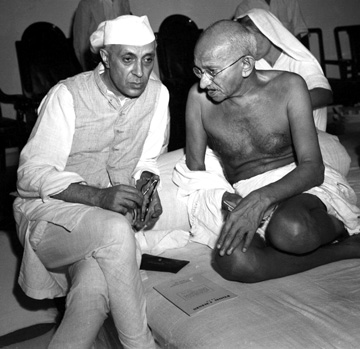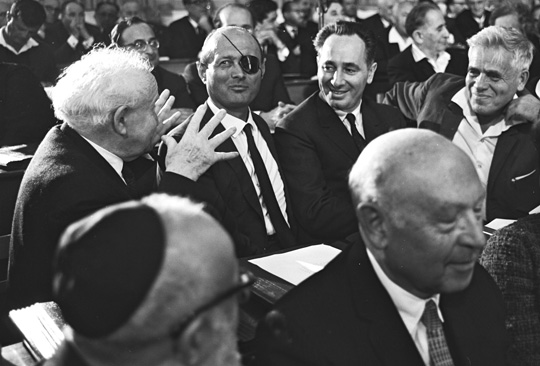Paradox or Pluralism?
The distinguished political philosopher and public intellectual Michael Walzer has written many excellent books, and this slim, suggestive volume is no exception. Walzer is at heart a man of the left, so he is sympathetic to the post-World War II secular revolutions he describes in the newly established secular states of India (1947), Israel (1948), and Algeria (1962). More to the point, he is dismayed by the religious counter-revolutions that have followed them within a generation or two. But he also has an open mind and is bereft of ideological hang-ups. Walzer is of course aware that there are important differences among the three (Algeria is, in several respects, an outlier), but he thinks that the tension between secularism and a resurgent religion in each case makes the comparison instructive. Having been trained in the tradition of Max Weber and thus internalized a fanatical belief in the value of comparison, I cannot help but agree.
Walzer’s paradox of liberation, if that is what it is, is that religion is back, or that despite the extraordinary success of secularizing revolutionaries it never quite went away. He writes:
Initially, at least, this is a success story: the three nations were indeed liberated from foreign rule. At the same time, however, the states that now exist are not the states envisioned by the original leaders and intellectuals of the national liberation movements, and the moral/political culture of these states, their inner life, so to speak, is not at all what their founders expected.
India, Israel, and Algeria are far more religious than Nehru, Ben-Gurion, or Ben Bella and their revolutionary colleagues ever envisioned. As Walzer writes a little later, each of the movements these men led promised victory over foreign oppressors and equal standing in the world. To achieve this, “the old ways” had to be repudiated, “[b]ut the old ways are cherished by many of the men and women whose ways they are. That is the paradox of liberation.”

The Indian National Congress was led by a thoroughly secularized elite that was essentially tone-deaf to religion in general and to the traditional Hinduism of most Indians in particular. Nehru was its English-speaking, English-educated leader and the first prime minister of the independent state of India. His political ideal was Westminster democracy and Fabian socialism. As Walzer remarks, Nehru once told John Kenneth Galbraith that he was “the last Englishman to rule in India.” Nonetheless, Nehru understood that Hindu symbolism was important to the core constituency of Congress and included the Wheel of Karma on the flag of the Republic. But the most important symbol was Gandhi himself, walking around in his loincloth, in the traditional persona of a Hindu holy man, notwithstanding the fact that his philosophy of non-violence owed more to Tolstoy than to the Vedas. I believe that Nehru’s respect for Gandhi’s moral authority was genuine, but something he is reported to have said about Gandhi in an apparently unguarded moment is revealing: “You can’t imagine what it costs to keep Gandhiji in poverty!”
What is essential is that the Indian National Congress from its beginnings emphasized that India did not just belong to Hindus but to all those who lived in it: Muslims, Christians, Jains, and those with weak or no religious affiliations. In the waning days of the British Raj the Muslim League had walked out of a pre-independence meeting called by Congress and proclaimed that Muslims needed their own state. This sharp difference in self-definition between India and what became Pakistan has determined the politics of the subcontinent ever since, at an enormous cost in bloodshed. Incidentally, Mohammed Ali Jinnah, who led the Muslim exodus, was just as secularized as Nehru.
The hegemony of the Indian National Congress is now a thing of the past. On the national level, it has been supplanted by the BJP (Bharatiya Janata Party), whose core constituency includes the membership of the RSS, a political militia that marches around in khaki shorts ironically resembling those of the colonial British forces (Walzer quotes the Indian social critic Ashis Nandy calling them “the illegitimate child of Western colonialism”). The RSS and other proponents of Hindutva hold that Hinduism is not just a religion among others but the center of a civilization to which all (notably Muslims and Christians) should “return.”
This failure of the forces of secular liberation to “consolidate their achievement and reproduce themselves” is another way of putting Walzer’s paradox of liberation, but is it really a paradox? Only if one takes secularity as the norm or thinks, as Nehru, Ben-Gurion, and Ben Bella all did, that their respective new countries had, to quote Nehru, a “tryst with destiny.”
Often a joke can illuminate a social reality. Here is one told by Indian traditionalists at the expense of secularists: A skeptical university graduate visits a holy man sitting in a yoga position with his eyes closed. “I understand you people believe that the earth is a huge disk supported on the back of a divine elephant.” The holy man continues to sit, saying nothing, keeping his eyes closed, and merely nods. The young man repeats his derisive question and gets the same response. Finally, after the question is repeated a third time the holy man opens his eyes, looks at the young graduate, and chants (first in Sanskrit, then in English): “My Lord Krishna commands me to say to you that in the next three lives you will return as a bedbug.” Or at least as junior partner in a parliamentary democracy dominated by religious parties.
Israel declared its independence in 1948, about one year after Nehru declared the independence of India. In both cases, it was the British colonial rulers who, at the stroke of midnight, took down the Union Jack. The founding elites of both countries were very secular and felt little empathy with the piety of ordinary people. Ben-Gurion was no more an observant Jew than Nehru was a practicing Hindu. Their political parties, respectively Labor and Congress, at first thought that religion would not be a major factor in the future. Both also had to cope with large Muslim minorities whom they imagined could be assuaged with citizenship rights. The secularists were surprised when this didn’t work and even more surprised when fiercely fundamentalist movements within their own communities challenged the secularity of the state. Those dramas are not yet played out.
Algerian independence was declared in 1962 after a conflict between the National Liberation Front (French acronym FLN) and France, fought with equal bloodthirstiness by both sides. French resistance to Algerian independence was especially bitter because Algeria was legally part of metropolitan France (unlike Morocco and Tunisia, which were French protectorates), its Arabs defined as French citizens of Muslim religion. Yet the state to which the liberation movement aspired was established as a secular republic. A little later the term “Islamic socialism” was adopted; as Walzer points out, it was actually Marxism with some decorations from the Qur’an. There is at least some resemblance between this and the Zionist use of bits and pieces of Judaism—decorations on a secular ideology that Walzer, fairly or not, calls “Jewish kitsch.”
Ahmed Ben Bella, the first president of Algeria, was shaped ideologically by French Marxism. The subsequent FLN regime became increasingly authoritarian and “Arabizing,” but, official policy notwithstanding, the Algerian elites, including the leaders of the ruling party, remained addicted to the French language. In the early 1990s the regime was fiercely challenged by an Islamist movement, for whom the Qur’an was certainly much more than decorative. The bloody civil war that ensued was an ironic replication of the earlier one, except this time it was not a French colonial force against an Arab insurrection, but an Arab military against jihad. The conflict simmers on in the aftermath of the (prematurely named) Arab Spring.
The following joke comes from Lebanon, but I think it would be understood in urbane circles in Francophone Algiers as well as Beirut: A woman is in labor in her elegant home (she belongs to a class whose physicians still make house calls). The husband and the doctor sit outside the bedroom, both smoking cigarettes (Gauloises, I imagine). Both are reading French newspapers. Cries of pain are heard from the bedroom, the woman moaning: “Je souffre! Oh mon Dieu, come je souffre! C’est insupportable! Come je souffre!” This goes on and on. The husband urges the doctor to go in and help his wife. “Too early,” says the doctor, who continues to read his paper. Then a piercing cry comes out of the bedroom: “Ya-Allah! Ya-Allah!” The doctor says “now!” and goes into the bedroom. (A similar joke was, not surprisingly, told by German Jews with the switch to Yiddish indicating the onset of labor.)
Is there a paradox in the return of these liberated societies to religion? And, more generally, does democracy require secularity? Only, it seems to me, if one holds a secularist world view and regards secularism as a societal norm.

Near the beginning of the modern period, the Dutch jurist Hugo Grotius spoke of formulating international law “etsi Deus non daretur” (as if God were not given). This is an early instance of a purely methodological secularism or atheism (Grotius was a pious Protestant). With this methodological principle in hand, one could formulate international law in 17th-century Europe where different states were Catholic, Lutheran, Calvinist, Anglican, and, for that matter, Russian Orthodox and Ottoman Muslim. Somewhat analogously, a secular methodology is a prerequisite of modern science and technology: Even a pious Catholic cannot perform surgery using Roman canon law. Like the Orthodox airline pilot, she sets about her task “as if God were not given.” This means that a religious tradition in a modern society must accommodate the fact that some areas of human life must be governed by a secular discourse. Democracy in a pluralist society is also clearly helped by a degree of separation between the state and religion, but it does not require secularism as a governing ideology.
Perhaps more importantly, I think that Walzer misses a major reason why secular liberation movements are very often “religionized.” Secular ideologies do not in the long run satisfy the need of human beings to give meaning to personal experience, especially that of pain and loss. They do not supply a theodicy in the broad sense given by Max Weber to an originally theological term for God in the presence of suffering and evil.
There is no greater tragedy than losing a child. But it appears that there is some comfort to be derived if the child dies from fighting for a cause that the parents believe in, such as the liberation of the nation. But no such comfort is available if the child dies of a disease or in an accident. I remember a story from the early years of the state of Israel, which I heard from an Israeli woman in tones of unmistakable disapproval. The three-year-old son of a neighbor had drowned in a wading pool. The woman who told the story heard someone express sympathy to the parents, adding: “And this now, when we need every Jew in this country!” The narrator in no way opposed the national cause, but she knew that such a political statement was inappropriate in the face of inconsolable grief.
In their different ways all the faiths—certainly Judaism, Hinduism, and Islam—have provided theodicies in the broad as well as the narrow sense for a very long time. I once summed up religion as the audacious attempt to conceive of the entire universe as being humanly significant. Another way of putting Walzer’s paradox is that it turns out that we humans find it very difficult to do without something like theodicy, however audacious or metaphysically improbable it may be. It would appear hard to pass on a cultural system or an ideology to the next generation without that audacious attempt.
Of the modern fundamentalists who have “brought backwardness back” in Israel, India, and Algeria Walzer writes that they “claim to embody the ancient traditions . . . oldness is their mantra.” He goes on:
And although the claim is false, the sense of oldness must account, at least in part, for the appeal of their program. They connect the liberated people to their own past; they provide a sense of belonging and stability in a rapidly changing world. With the old imperial oppressors gone, they also provide recognizable, even familiar “others” as objects of fear or hate . . . Sometimes the “others” are members of a rival religion, sometimes they are “Westernizing” leftists, secularists, heretics, and infidels—traitors, it is said, in our midst.
This is all true at one level, of course, but nothing Walzer says here or elsewhere seems to really recognize the transcendent claims, consolatory appeal, or experiences provided by the religions under discussion. Nor does it recognize religion as a context in which to express the most basic questions about our place in the universe. Pascal described the human condition as standing at the midpoint between “the nothing and the infinite,” and religion has been the principal vehicle through which this truly paradoxical position and our ensuing wonder at the universe have been expressed.
Walzer’s central case is Israel. He is both puzzled and frankly disappointed that its founders failed to create a new secular culture “thick or robust enough to sustain itself” without the unwanted help of traditionalism. I am not quite sure that this is the way the issue should be framed. On the one hand, groups that assert their superior wisdom and virtue with great pretensions of certitude always have a tactical edge over those whose convictions are less apodictic and more moderate. On the other, there is, by almost any measure, a robust secular culture in Israel, which is very much alive and tempting to those outside it. I don’t know which traffic is larger—that of secularists tempted by the self-assured fundamentalism of Meah Shearim, or that of haredim seduced by the fleshpots and discos of Tel Aviv, which I recently saw advertised in a European travel magazine as “the coolest city on the Mediterranean.”
Walzer almost seems to think that things might have been, or might still be, otherwise if only the cultural program of some early leading Zionist intellectuals were followed more vigorously:
[A]longside the ongoing work of negation, the tradition has to be acknowledged and its different parts ingathered, as the poet Bialik argued: collected, translated, incorporated into the culture of the new. Only then can traditional Judaism be pulled apart, its most important features—laws and maxims, ceremonies and practices, historical and fictional narratives—critically appraised. . . . Only then can they become the subject of ongoing argument and negotiation.
In the end, he thinks that although such engagement with the tradition should have been undertaken, it wouldn’t have prevented the resurgence of the haredim or the rise of religious nationalism. However, he says, in his characteristically mild, hopeful secularist voice, “it might have improved the odds—it might still improve the odds—for the eventual success of Jewish national liberation.”
Rarely does a joke reveal a social and religious reality as sharply as this Israeli one: A woman and her young son are riding on a bus speaking Yiddish sometime in the 1950s. A staunch Labor Zionist fellow-passenger is annoyed and scolds her: “You are in Israel now, not in the diaspora. Why don’t you speak Hebrew with your son?” To which she replies: “So that he won’t forget that he is a Jew.” It is this tension that Walzer would like to ameliorate.
Whether it is a paradox or not, Walzer has focused our attention on an interesting pattern: successful secular liberation movements that seem—though he claims no “covering law”—almost inevitably to be followed by a religious counter-revolution within a generation or two of the founding of the new state. I want to briefly draw attention to another case, that of a liberation movement that was not followed by a religious counter-revolution: the Risorgimento of the 19th century, which led to the unification of Italy and, in time, a modern nation-state. In doing so I am not so much changing the subject as expressing my Weberian penchant for the value of comparisons—the more the merrier. (It will also take us on a somewhat circuitous route back to our starting point.)
Napoleon’s invasion of Italy shattered the jigsaw puzzle of kingdoms, duchies, sovereign cities, and the Papal States, and introduced new revolutionary ideas into the territory. Those who had been running the jigsaw puzzle were not amused, and the forces of reaction were powerfully supported by the Roman Catholic Church and the Habsburg monarchy, which between them controlled large chunks of the country. The Risorgimento had no coherent ideology beyond the idea of a unified Italian state. But the state envisaged was to be a modern and secular one, very much in the line of the French Revolution, whose ideas were carried throughout Europe in the writings of intellectuals and on the bayonets of Napoleon’s armies. The Risorgimento had diverse factions, among them the utopian one led by the charismatic warrior Giuseppe Garibaldi. But the leadership eventually fell into the cool hands of Camillo Benso, Count of Cavour, an aristocrat who ended up in the service of the king of Savoy (later Victor Emmanuel I of Italy).
In 1870 Savoy’s elite troops, the Bersaglieri, occupied Rome and made it the capital of Italy. The Papal States were incorporated into Italy and Pius IX, deprived of even the vestiges of his earthly power, declared himself a prisoner in the Vatican. A monument to the Bersaglieri was erected showing one of the troopers with the distinctive plumed hat and running—Bersaglieri never march, they always run—positioned so that its behind was aimed directly at the Vatican.
The Italian state remained secular, even anti-clerical, although the Catholic piety of most Italians continued for a long time. Yet, the state created by the soberly Machiavellian Count of Cavour retained a utopian, even sacred, flavor in its mission of incorporating all Italian-speaking territories. These territories, most of them in Austro-Hungarian hands, were called Italia irredenta (unredeemed Italy). Many of their inhabitants truly believed that becoming citizens of Italy would somehow “redeem” them personally. In fact, my maternal grandfather, who was born in Vienna, and worked as a doctor on passenger ships sailing out of the mostly Italian-speaking city of Trieste, became convinced that Italy was the only civilized country in the world. When Trieste was annexed by Italy after World War I, he became an Italian citizen and fervent patriot.
Despite Mussolini’s opportunistic concordat with the Church, the secularism of the Italian state continued under fascism. After World War II there was no religious counter-revolution. The Christian Democrats were merely in favor of Christian values, broadly construed. When the Second Vatican Council liberalized the Church, declaring, among other things, that religious freedom was a basic human right, it certainly did not reverse the secularization of Italian society. Neither has the Church’s more recent call for a “new evangelism.”
I once believed and propounded a sociological theory of the inevitability of such secularization, but it now seems to me that the secularization of Europe and the educated elites of North America—and, for that matter, New Delhi and Tel Aviv—are exceptions rather than the rule. Modern secularity is, if not exactly a paradox, more in need of explanation than the ashrams of India, the yeshivas of Israel, or the madrasas of Algeria. What I think Walzer has very usefully pointed us to is not the paradox of resurgent religion but rather the inevitability of continuing pluralist coexistence between secular and religious spaces in the modern state as well as in individual lives.
Suggested Reading

Israel’s Sea Change
The first Zionist ship was a refurbished English vessel with 20 years of rough service behind her, including the wartime evacuation of Singapore in 1941.
Marginalia
Israeli director Joseph Cedar's new film Footnote was anything but that at the Cannes Film Festival, despite its setting in the Hebrew University Talmud department.

Homer of Lod: The Indispensability of Erez Bitton
The blind writer from Algeria is one of Israel’s most important voices, both in poetry and in policy.

Our Challah Moment
America is having a challah moment that coincides with two food movements in popular culture.
Comments
You must log in to comment Log In